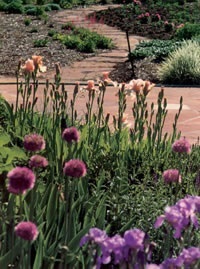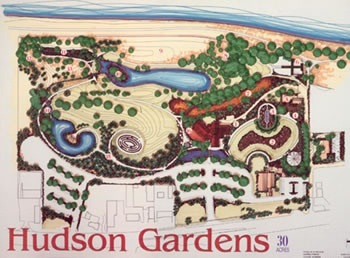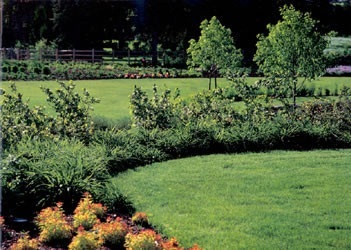Hudson Family and Hudson Gardens

Evelyn and Colonel King Hudson's beautiful legacy, Hudson Gardens, is enjoyed by thousands each year.
Evelyn and Colonel King Hudson loved their estate on the banks of the South Platte River in Littleton and shared their enjoyment with the thousands who came to visit their Country Kitchen restaurant during its twenty-year operation.
After King's death, Evelyn set up in 1986 the foundation that bears her and her husband's name with the purpose, "to preserve, maintain and enhance the natural beauty of [the] property...for the esthetic enjoyment and education of the public...."
A year later, in her will Evelyn Hudson was a little more specific: "...It is my express desire that the real property received by the Foundation under this bequest be retained by the Foundation and administered in such fashion as to preserve and/or enhance the natural beauty of such real property for the aesthetic enjoyment for education of the public under conditions of use best suited to ensure and foster such enjoyment and use."
After Evelyn's death the Foundation's Board of Directors developed a Statement of Purpose that was revised until it became its current Mission Statement. It reads, "Hudson Gardens seeks to promote the cause of beautification through horticulture by creating and operating a regional display garden available to all people for their education and enjoyment."
Hudson Gardens, which has literally grown from Evelyn and King Hudson's legacy of land and assets that they had built up over a period of almost fifty years, continues to bring beauty, enjoyment and education to the people.
Evelyn Leigh was born in Aurora, Illinois on February 23, 1905. She studied restaurant operation at the Lewis Institute in Chicago and developed skills as a food professional when she managed four Chicago department store restaurants. She had always hoped for her own "tea house."
King C. Hudson hailed from Topeka, Kansas. He was born June 4, 1893. In 1915 he graduated from the Northwestern University dental school and seven years later secured a law degree from the Chicago Kent College of Law. He taught dietetics at Northwestern. During World War I he was in the Army dental corps and continued as a reserve officer while conducting a private dental practice in Chicago.
Evelyn Leigh and King Hudson were married in Chicago June 17, 1940. When World War II threatened, he was recalled to active duty and served at Fitzsimmons Army Hospital and at Fort Logan near Denver.
Once in Colorado, Evelyn began the quest for her own restaurant. Houstoun Waring, writing in the Littleton Independent in 1988 said, "She kept looking for a good site and found the Gutheil [property] at 6115 South Santa Fe Drive on the east side of the South Platte. What drew her to the place were the enormous trees and the rhubarb plants." The Colonel, who shared Evelyn's enthusiasm, resigned from the Army, and they began to build their log Country Kitchen restaurant in December 1941. The first unit opened in May 1942. The large room on the south, that became the main dining room, was added in 1945. The Hudsons lived in an apartment in the building.
Littleton old-timers told them, "It will never succeed if you go off Main Street." Worse than that, the site was on a dirt road ten miles from the heart of Denver, an unlikely location to start a restaurant.
Writing later about the Country Kitchen's opening in 1942, Houstoun Waring said, "Some evenings brought sparse patronage...Col. Hudson suggested having a smorgasbord each Thursday. Seventy tempting dishes (for $1.25) were prepared, and the crowds came. The smorgasbord [became] a nightly treat. So were sit-down meals with Evelyn's favorite delicacies--fried chicken, scalloped potatoes, Swedish rye bread and corn sticks." They served fresh vegetables, many of which were grown on the grounds. A small "lettuce house" behind the main building was where the salads were prepared.
The excellence of their restaurant became well known and was recognized by Life magazine in its Famous Roadside Inns for Travelers in America. Duncan Hines rated the restaurant highly, and it was featured in an issue of Ford Times. Adding to its appeal was its style, warmth and antique accessories.
The Country Kitchen was so successful that the Hudsons eventually were able to operate it for only six months each year, closing from October through March. During the winter months they traveled the world to sightsee and to experience culinary delights. Houstoun Waring wrote that upon their return, they often gave their travel notes to Bill Hosakawa of the Denver Post to write the little booklets called Tummy Travels, which Bob Ramsey of Littleton illustrated. The logo was a horse-drawn buggy-seemingly dashing to the Country Kitchen.
The Hudsons increased their acreage until it became a lovely estate of almost forty acres. They cared for their riverbank land with an environmental consciousness rarely seen in that era.
After twenty years of operating their country inn, the Hudsons retired in 1962 and leased the restaurant to other operators who opened the North Woods Inn. Just before retirement, King designed their new home that incorporated a very old house on the property. Located behind the inn and close to the river, it afforded a mountain view and an opportunity to display the many interesting items collected during their travels.
King continued to plant even more trees and indulged his love of raising prize American Saddle Bred horses. Evelyn set to work to make Littleton the most beautiful city possible. She encouraged garden clubs and scouts to plant flowers in parks and at the entrances to Littleton. In 1971 the newspaper honored her with its "Most Valuable Citizen" award. Also in the 1970s she traveled to Washington, D. C. to accept the "Keep America Beautiful Award."
King Hudson died March 2, 1984 at age ninety. Soon afterwards Evelyn set up the Colonel King C. and Evelyn Leigh Hudson Foundation. It was incorporated in March 1986. The Foundation's first board of directors were Evelyn Hudson, Chairman, Dee Gustafson, Donald Hadfield (Evelyn's nephew) and Marilyn Schalge. Evelyn died July 7, 1988 at eighty-three. The Hudson estate was valued at about $5.25 million; except for several bequests to family members and friends, the bulk of it was left to the Foundation.
As noted above, the land that the Hudsons accumulated was approximately forty acres. Before her death, Evelyn had sold about eight acres for relocation of the South Platte River channel. A tract of about two acres lay on the west side of the river and was eventually sold by the Foundation to the South Suburban Park and Recreation District and became part of their Centennial golf course. This left about thirty acres, three of which was under lease to the North Woods Inn restaurant. When the lease expired in November 1997, the Hudson Foundation regained possession of the log building and its surrounding acreage, making thirty acres of usable space to carry out its mission.
In May 1987 the Foundation received its classification as a private, non-profit 501(c)(3) foundation, and in January 1993 it was classified as a private operating foundation. In the early 1990s the Foundation bought the Woodward property directly north of Hudson's original lane. The small house there is used for offices.
The Foundation contracted with landscape architect Doug Rockne in 1991. In April 1992 it retained the services of Andrew Pierce as an independent consultant for horticultural design to work with Rockne's garden design. Pierce's initial contract was followed by a series of contract extensions. His job was to implement the landscape plan already established by the Foundation. He was subsequently hired as Director of Horticulture and Education.

The result became Hudson Gardens, thirty acres of flowers, shrubs, trees, ponds and paths at 6115 South Santa Fe, alongside the South Platte River and the popular Mary Carter Greenway. It opened in June 1996. The Garden Variety gift shop opened in August that year.
In November 1997 South Suburban Park and Recreation District purchased the buildings and grounds. Under the management contract between the District and the Foundation, the Foundation continues to operate the Gardens. South Suburban provides some, but not all, of the annual operating budget. The balance is made up by garden attendance, memberships, space rentals and fundraising.
Hudson Gardens was originally sixteen distinct gardens, from a rose garden to a water garden to an alpine rock garden, all composed of plants that grow well in Colorado's climate. In 2000 the XeriscapeTM garden and a G-gauge garden railroad were added. The Gardens currently include an herb garden, iris display bed, Monet's Place, songbird garden, Victoria water lily pond, wildflower meadow, dahlia display bed and more.

A second entrance leads from the Mary Carter Greenway trail into the gardens. Beside it is a popular snack bar that is open during spring and summer. The demonstration building and the demonstration garden are nearby. A corps of volunteers is used at almost every level throughout the Gardens operation.
Now known as Hudson Gardens and Events Center, the site is a popular place for weddings, concerts and seasonal holiday events. The Gardens offer a canopy that accommodates 250 people and a stage with lawn seating for an audience of 2,500. A complete schedule of events appears on the web site at http://www.hudsongardens.org.
The log restaurant was beautifully renovated in 1997 and is now known as The Inn at Hudson Gardens. It seats 250 people and is available for catered events. It and the canopy and stage setting are booked far in advance. The Hudson residence is used for administrative offices and board meetings. The Gardens are open year round and there is currently no entrance fee. Membership in the organization includes reduced charges for activities such as classes and programs.
The historic log structure, the former Country Kitchen where it all began, is treasured as the source of the generous legacy of land and assets that was left by the Hudsons to be developed as a beautiful garden "available to all people for their education and enjoyment."
Bibliography
Chambers, Susan. Research report prepared for Littleton Historical Museum. "[Littleton] Parks and Recreation," 2001.
The Denver (Colo.) Post. The Denver Post Publishers, 1895-
Ellingboe, Sonya. Telephone interviews. February 24, 2001 and June 28, 2003. Littleton, Colorado.
Hudson, Evelyn Leigh. Last Will and Testament. February 11, 1987. King C. Hudson and Evelyn Leigh Hudson Foundation, Inc., Hudson papers.
Hudson, Evelyn and Colonel King Hudson. Tummy Travels. Littleton, Colorado: Evelyn and Colonel King Hudson, 1948-1960.
King C. Hudson and Evelyn Leigh Hudson Foundation, Inc. Articles of Incorporation, March 12, 1986. Hudson Foundation, Hudson papers.
____. Brochures, fact sheets, information sheets, meeting minutes, memoranda, press release, 1991-2000. Hudson Foundation, Hudson papers.
____. Estate Tax Return, October 1989. Hudson Foundation, Hudson papers.
____. Lease Agreement with Fred and Pat Maten, November 1987-November 1997. Hudson Foundation, Hudson papers.
Littleton (Colo.) Independent, Littleton Independent Publishers, 1888-
Schalge, Marilyn, Telephone interviews. January 22 and March 6, 2001. Littleton, Colorado.
United States Internal Revenue Service. Notice of Status as Operating Foundation, December 13, 1993. Hudson Foundation, Hudson papers.
____. Notice of Tax Exempt Status, May 18, 1987. Hudson Foundation, Hudson papers.
Photographs courtesy of the Littleton Museum unless otherwise noted. To order copies, contact the museum at 303-795-3950.
Compiled by Doris Farmer Hulse
Updated March 2021 by Phyllis Larison